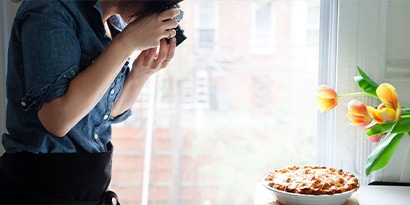-
Q&A: Does my indoor air get dirty when I have guests?
If you’re playing host to friends or family this season, here’s what you need to know about cleaning the air after guests have gone home.
Hosting a gathering doesn’t just mean tidying the house before your guests arrive — it also means cleaning up after you’ve said your goodbyes. Cleaning countertops, carpets and high-touch surfaces is fairly self-explanatory, but what about cleaning the air? Read on for answers to all your post-party air quality questions.
-
Q: Can having company worsen home indoor air quality?
A: Yes. Just like you can bring unwanted airborne particles into the house when you come home, so can your guests. Things like pollen, pet dander and volatile organic compounds from aerosol products can all sneak inside on peoples’ coats and clothing. In the winter, pollutants from vehicle exhaust and smog can be present in rain and snow and get tracked in on snow boots and shoes.1
The activities you might normally do when you have company can contribute to reduced air quality, too. Lighting candles, using fireplaces and cooking with oil can all add smoke, soot and exhaust particles to your air. Simply having the windows closed with a group of people inside can lead to stale, stuffy air — and air that’s not circulating or being ventilated can be of poor quality.2
Q: How can I tell if my indoor air quality has been reduced?
A: Sometimes, we clean surfaces even if they don’t look dirty, because we know there are germs or other unwanted particles there that we can’t see. The same goes for your air: Just because it’s not stuffy or smelly doesn’t mean it’s not polluted. Unless you’re particularly sensitive to particle pollution or allergens, you likely won’t be able to tell when there’s airborne particles floating around. You can purchase air quality monitors to tell you when the air dips to unhealthy levels, but they won’t actually clean the air. Filtrete™ Smart Air Purifiers monitor your air quality and use True HEPA filters, which capture 99.97% of airborne particles,* and come equipped with an air quality monitor that lets you know how your indoor air is doing via color-coded light.
Q: How do I keep my indoor air clean while guests are in the house?
A: Ventilate, ventilate, ventilate! If a room is poorly ventilated, there’s nowhere for polluted air to go and you and your guests can end up breathing it in.3 Run bathroom and kitchen fans, switch your HVAC system on and open some windows. Even if it’s winter, don’t be afraid of letting a little cold air in — high temperatures can increase the concentration of some pollutants in the air.3 Make sure to check your outdoor air quality on the Filtrete™ Smart App before opening windows. If air quality outside is poor, it’s best to keep the windows closed.
Q: How do I get fresher air after guests leave?
A: The air in your home might be feeling pretty stuffy after several hours of cooking, cleaning and catching up with your favorite people. Keep that ventilation going to improve air quality. You can also improve the smell of your indoor air throughout the house with a Filtrete™ Whole House Air Freshener. These handy air fresheners stick to your HVAC filter and distribute scents like citrus, lavender and crisp cinnamon apple to multiple rooms in your home.
*As small as 0.3 microns, from the air passing through the filter media. Initial efficiency value.
Sources
1. SciEd.UCAR.edu: How Weather Affects Air Quality
2. URMC.Rochester.edu: Indoor Air Can Cause Health Problems
3. EPA.gov: Introduction to Indoor Air Quality
-



